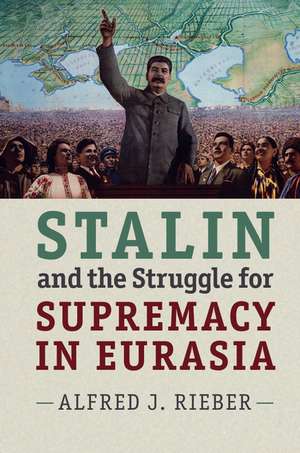Stalin and the Struggle for Supremacy in Eurasia
Autor Alfred J. Rieberen Limba Engleză Paperback – 24 aug 2015
| Toate formatele și edițiile | Preț | Express |
|---|---|---|
| Paperback (1) | 243.53 lei 3-5 săpt. | |
| Cambridge University Press – 24 aug 2015 | 243.53 lei 3-5 săpt. | |
| Hardback (1) | 634.95 lei 6-8 săpt. | |
| Cambridge University Press – 26 aug 2015 | 634.95 lei 6-8 săpt. |
Preț: 243.53 lei
Nou
Puncte Express: 365
Preț estimativ în valută:
46.60€ • 48.78$ • 38.56£
46.60€ • 48.78$ • 38.56£
Carte disponibilă
Livrare economică 15-29 martie
Preluare comenzi: 021 569.72.76
Specificații
ISBN-13: 9781107426443
ISBN-10: 1107426448
Pagini: 429
Ilustrații: 13 maps
Dimensiuni: 152 x 228 x 21 mm
Greutate: 0.57 kg
Editura: Cambridge University Press
Colecția Cambridge University Press
Locul publicării:New York, United States
ISBN-10: 1107426448
Pagini: 429
Ilustrații: 13 maps
Dimensiuni: 152 x 228 x 21 mm
Greutate: 0.57 kg
Editura: Cambridge University Press
Colecția Cambridge University Press
Locul publicării:New York, United States
Cuprins
Introduction; 1. Stalin: man of the borderlands; 2. Borderlands in Civil War and intervention; 3. The borderland thesis: the West; 4. The borderland thesis: the East; 5. Stalin in command; 6. Borderlands on the eve; 7. Civil wars in the borderlands; 8. War aims: the outer perimeter; 9. War aims: the inner perimeter; 10. Friendly governments in the outer perimeter; Conclusion: a transient hegemony; Index.
Recenzii
'In this thorough study, Rieber analyzes the struggle for control of Eurasia's borderlands from the collapse of the Romanov, Habsburg, Ottoman, Qing, and Persian empires through the end of WWII. He focuses on Stalin, emphasizing the ways in which the Soviet leader's foreign policy echoed approaches of his imperial predecessors. Stalin was a 'man of the borderlands', shaped by his experiences growing up in Transcaucasia and building a revolutionary state on the ruins of a multiethnic empire … 'Stalin's pragmatism', writes Rieber, 'was the pragmatism of a Marxist-Leninist tempered by his grasp of the historical foundations of Russia's status as a great power'. Summing up: highly recommended. Upper-division undergraduates and above.' M. A. Soderstrom, Choice
'Beautifully written and richly documented … based on many archival materials made available in the post-Soviet era … Those with some knowledge of Soviet domestic and foreign policies will benefit the most from this book, but even those lacking a background in Soviet affairs would still benefit from reading it. It is an extremely timely work providing an understanding of the turbulent relations of Russia and the USSR with its neighbors, including Ukraine and, in that regard, provides an important tool for helping us understand Russian-Ukrainian relations today.' Nathaniel Richmond, The Russian Review
'This is an ambitious and overarching reinterpretation of Stalin's domestic and foreign policies - or actually the connections between the two - from the revolution and civil war periods through World War II and the dawn of the Cold War … Rieber's book provides some insights and historical background to the current Kremlin's profound and clearly long-standing fear of hostile states on its periphery, and the belief that a ring of friendly buffer states around Russia are vital to the security of the state.' Paul Stronski, Slavic Review
'Rieber's elaboration of the borderlands thesis in Stalin and the Struggle for Supremacy in Eurasia is a tour de force. The problem is that its brilliance dazzles as well as illuminates.' Geoffrey Roberts, H-Diplo
'Stalin and the Struggle for Supremacy in Eurasia is a very rich text and readers from many fields and area studies will find useful information to mine.' David Wolff, H-Diplo
'Beautifully written and richly documented … based on many archival materials made available in the post-Soviet era … Those with some knowledge of Soviet domestic and foreign policies will benefit the most from this book, but even those lacking a background in Soviet affairs would still benefit from reading it. It is an extremely timely work providing an understanding of the turbulent relations of Russia and the USSR with its neighbors, including Ukraine and, in that regard, provides an important tool for helping us understand Russian-Ukrainian relations today.' Nathaniel Richmond, The Russian Review
'This is an ambitious and overarching reinterpretation of Stalin's domestic and foreign policies - or actually the connections between the two - from the revolution and civil war periods through World War II and the dawn of the Cold War … Rieber's book provides some insights and historical background to the current Kremlin's profound and clearly long-standing fear of hostile states on its periphery, and the belief that a ring of friendly buffer states around Russia are vital to the security of the state.' Paul Stronski, Slavic Review
'Rieber's elaboration of the borderlands thesis in Stalin and the Struggle for Supremacy in Eurasia is a tour de force. The problem is that its brilliance dazzles as well as illuminates.' Geoffrey Roberts, H-Diplo
'Stalin and the Struggle for Supremacy in Eurasia is a very rich text and readers from many fields and area studies will find useful information to mine.' David Wolff, H-Diplo
Notă biografică
Descriere
This is a major re-evaluation of Soviet foreign policy in the Eurasian borderlands from the Revolution to the Cold War.













